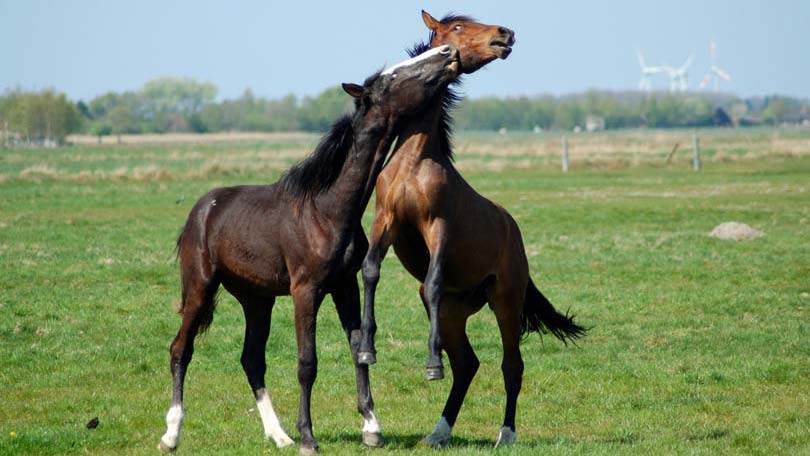Horses are herd animals, so the solitary horse is probably lonely. If you have a horse that paces fence lines or cries when it is stalled in a barn where she cannot see another horse, you are confining her to a life that is not natural to her.
If you turn out a horse by itself in order to prevent her from being injured by other horses in the field, you may be doing more harm than good. A horse will present loneliness by excessive whinnying or pacing the fence lines. Both of these signs cause stress to the horse, which can lead to ulcers. Stomach ulcers present through a loss of appetite, the horse becomes a hard keeper; hair coat becomes dull; behavioral or training problems arise; horse tries to bite or kick during girthing; lack of enthusiasm for work. In order to properly diagnose a horse with ulcers, a scope is performed by your vet, which allows a visual picture of the stomach and esophagus to be seen. Ulcers can range from grade one through five. Proven treatments involve a medication called Gastroguard. Ulcers will not clear up if left untreated. They are suspected to be present in up to 90% of the equine population, and can be fatal if left untreated.
Pacing can also put unnecessary strain on a horse’s legs. Joint and tendon damage can result from this type of repetitive wear. Ringbone can also be a problem, which results from the constant turning that strains her ligaments. These types of degenerative issues will result in the lameness of your animal, and treatments will range from stall rest (up to six months in some cases), to shock wave therapy, pain relievers, and steroids.
If you cannot afford to have another companion for your horse, a smaller, less expensive animal may be the answer. Many horses will respond to a small pony, goat, donkey, or llama. If this is not a feasible option, placing an advertisement for a boarder may be the answer. Adding one or two boarded horses to your barn may give both you and your horse a peace of mind. Responsibilities can be shared, as well as expenses.
If all else fails, there are medical or herbal remedies that you can try to soothe your lonely horse. One such treatment is Ignatia, which can be given to calm those experiencing separation anxiety. There are other types of relaxants that can be given by your veterinarian, so consult him before beginning any type of medicinal therapy on your horse.
An unhappy horse will make for an unhappy owner. She may become unwilling, mean, or listless. Making your horse happy will ensure that she is willing to perform the required work for you to the best of her ability.






